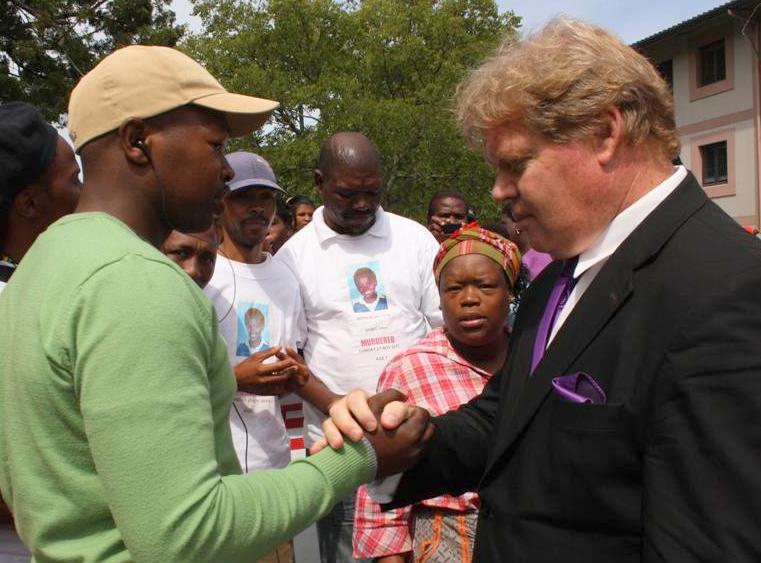The three had faced murder charges for the mob killing of a man believed to have raped and killed seven-year-old Siphokazi Nini.
The horrific murder took place on November 28, 2011.
The three charged with the murder of suspected rapist and murderer Mzimkhulu Derick Tshwati, were KwaNokuthula community leaders Mlamli Desi, Michael Besana and Mbonisi Tuli.
The main state witness, station commander Lieutenant Colonel Gideon Lugebu of KwaNokuthula police testified that after seeing the brutally murdered body of the little girl, he was in such a state of shock that he couldn't think straight for hours. This, he says, was the reason Dercksen was able to point out various important discrepancies between his original statement and his testimony in court.
Nini's body was discovered in November 2011, after Tshwati, a convicted rapist and family member of the little girl reportedly confessed, under pressure from people who knew and suspected him, to having raped and killed her. Once he had led some community members to where he had hidden away Nini's mangled body, the gathering crowd apparently got so infuriated, that they chased and began beating Tshwati. By the time the police managed to reach the fleeing Tshwati among an enraged crowd of 2 500 in a state of mass agitation, he reportedly was still alive, but died on the scene from multiple injuries.
Prosecutor Aletta Stanvliet conceded that Lugebu's testimony was unsatisfactory. Four policemen, who had been on or near the scene of the violent retribution that day, testified for the State, two of whom said they were unable to link any of the suspects to the killing of Tswathi. One, however, did say that he had seen Thuli aim a short pole at Tswathi, but he could not say for certain if he had actually hit him.
According to Dercksen, the death of Tshwati was primarily caused by female members of the community who had acted out of revenge for the rape and brutal murder of Nini.
In his judgement, district magistrate Herman Buhr said that Tshwati, like any other human being, had "the right to life" and that the community had no right to take the law into their own hands.
"Had he been proven guilty of the rape and murder of Nini, the law should have followed its course," said Buhr. He agreed that there was not sufficient evidence to convict the three men and ruled that they should be acquitted of the charges against them and set free, to roaring response from a jam-packed court gallery.
Southern Cape chairperson for the South African National Civic Organisation (Sanco), Themban Lobese, praised the community for their continued support. They held a meeting on Sunday, March 3 to discuss the aftermath of the court verdict and to celebrate.
"This is not the victory of these three men alone, but the victory of a community who stood by each other," says Lobese, "We really want to extend our sincere gratitude to every household who, since 2011, has contributed R10 for transport for every single court date. We also wish to thank the Ncedo Taxi Association for giving us special rates, making it possible for us to get our supporters to court. Also the churches for helping us raise funds - everyone has been phenomenal. Also Mr Dercksen, whom we have come to respect and trust."
Lobese said that the KwaNokwathulu community would continue to fight crime and that although they do not encourage anyone taking the law into their own hands, they will not tolerate criminals in their midst.
"We are appealing to the highest authority for a proper police station in our community as they have no building to work from and are understaffed."
The KwaNokwathulu community have began doing night patrols in crime hot spot areas.

Southern Cape Sanco chairperson, Themban Lobese, shakes hands with defence lawyer Daan Dercksen in a serious moment before the crowd erupted in victory songs.
ARTICLE: ANOESCHKA VON MECK, KNYSNA-PLETT HERALD JOURNALIST
















